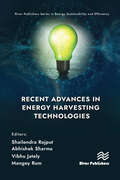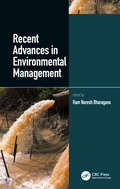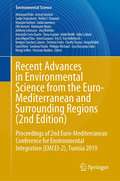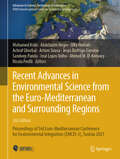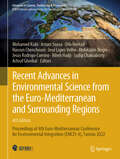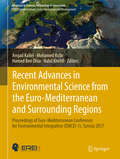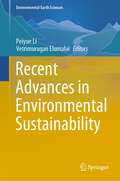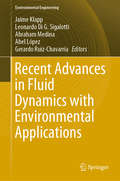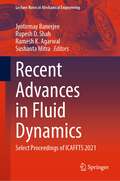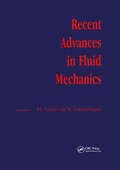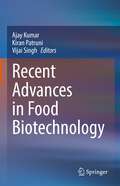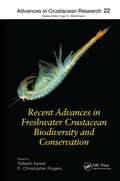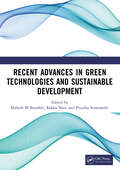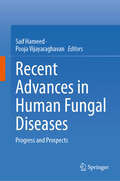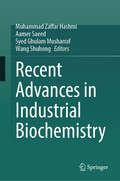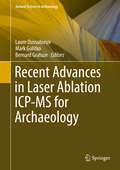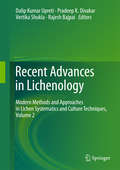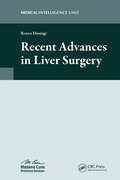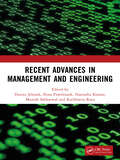- Table View
- List View
Recent Advances in Electrochemical Promotion of Catalysis (Modern Aspects of Electrochemistry #61)
by Constantinos G. Vayenas Philippe VernouxThis contributed volume provides a critical review of research in the field of Electrochemical Promotion of Catalysis (EPOC). It presents recent developments during the past decade that have led to a better understanding of the field and towards applications of the EPOC concept. The chapters focus on the implementation of EPOC for developing sinter-resistant catalysts, catalysts for hydrogen production, ammonia production and carbon dioxide valorization. The book also highlights the developments towards electropromoted dispersed catalysts and for self-sustained electrochemical promotion which are currently expanding. This authoritative analysis of EPOC is useful for various scientific communities working at the interface of heterogeneous catalysis, solid state electrochemistry and materials science. It is of particular interest to groups whose research focuses on developments towards a better and more sustainable future.
Recent Advances in Energy Harvesting Technologies (River Publishers Series in Energy Sustainability and Efficiency)
by Mangey Ram Abhishek Sharma Vibhu Jately Shailendra RajputEnergy demand is continuously rising, mainly due to population growth and rapid economic development. There are substantial worries about the environmental effects of fossil fuels in addition to the uncertainties surrounding the long-term sustainability of non-renewable energy sources. Environmental safety concerns are driving an increase in the demand for renewable energy production. Numerous efforts have been paid to harvest energy from ambient sources, e.g. solar, wind, thermal, hydro, mechanical, etc. This book discusses the application of artificial intelligence (AI) for energy harvesting. The implementation of metaheuristics and AL algorithms in the field of energy harvesting system will provide a quick start for the researchers and engineers who are new to this area. Energy harvesting technologies are growing very speedily, hence it is necessary to summarize recent advances in energy harvesting methodology. Over the recent years, a considerable amount of effort has been devoted, both in industry and academia, towards the performance modelling and evaluation of energy harvesting technologies. This book is the result of a collaborative effort among different researchers in the fields of energy harvesting and artificial intelligence. Technical topics discussed in the book include: Hybrid algorithms Mechanical to electrical energy conversion Swarm intelligence MPPT technologies Polymer nanocomposites
Recent Advances in Environmental Management
by Ram Naresh BharagavaThis book focuses on the toxicity of various organic and inorganic pollutants, their eco-toxicological effects and eco-friendly approaches for remediation of environmental pollutants. Extensive focus has been relied on the recent advances in ecofriendly approaches such as bioremediation and phytoremediation technologies, including the use of various group of microbes for remediation of environmental pollutants, etc. Researchers working in the field of bioremediation, phytoremediation, waste management and related fields will find this compilation most useful for further study to learn about the subject matter.
Recent Advances in Environmental Science from the Euro-Mediterranean and Surrounding Regions: Proceedings of 2nd Euro-Mediterranean Conference for Environmental Integration (EMCEI-2), Tunisia 2019 (Environmental Science and Engineering)
by Jörg Römbke Vincenzo Naddeo Sandeep Panda Amjad Kallel Mohamed Ksibi Nabil Khélifi Helder I. Chaminé Maurizio Barbieri Elena Xoplaki Abdelazim Negm Achraf Ghorbal Sudip Chakraborty Giulia Guerriero Olfa Hentati Anthony Lehmann Armando Costa Duarte Gilles Colinet João Miguel Dias Imed Gargouri Eric D. Van Hullebusch Benigno Sánchez Cabrero Settimio Ferlisi Chedly Tizaoui Sami Rtimi Philippe Michaud Jaya Narayana Sahu Mongi SeffenThis book includes over three hundred and seventy-five short papers presented during the second EMCEI, which was held in Sousse, Tunisia in October 2019. After the success of the first EMCEI in 2017, the second installment tackled emerging environmental issues together with new challenges, e.g. by focusing on innovative approaches that contribute to achieving a sustainable environment in the Mediterranean and surrounding regions and by highlighting to decision makers from related sectors the environmental considerations that should be integrated into their respective activities. Presenting a wide range of environmental topics and new findings relevant to a variety of problems in these regions, this volume will appeal to anyone working in the subject area and particularly to students interested in learning more about new advances in environmental research initiatives in view of the worsening environmental degradation of the Mediterranean and surrounding regions, which has made environmental and resource protection into an increasingly important issue hampering sustainable development and social welfare.
Recent Advances in Environmental Science from the Euro-Mediterranean and Surrounding Regions: Proceedings of 3rd Euro-Mediterranean Conference for Environmental Integration (EMCEI-3), Tunisia 2021 (Advances in Science, Technology & Innovation)
by Sandeep Panda Mohamed Ksibi Abdelazim Negm Achraf Ghorbal Olfa Hentati Arturo Sousa Jesus Rodrigo-Comino José Lopes Velho Ahmed M. El-Kenawy Nicola PerilliThis edited book includes over one hundred and eighty short papers that were presented during the third edition of EMCEI, which was held in Sousse, Tunisia, in June 2021. Nowadays, experts as well as most of the general public know that the Mediterranean and surrounding regions are facing environmental degradation that is accelerating at an unprecedented rate. The main causes are the natural and human induced climate change, increasing pollution, urban growth, and the overexploitation and unsustainable use of resources due to rapid population growth. The effects are seen in several indicators such as the warming, more frequent extreme events, severe droughts, water shortages, contraction of natural resources, changes in land use and landscape deterioration, decreasing agricultural yields, biodiversity loss, deterioration of the ecosystems, corrosion of the natural coastal environment, sea-level rise, and ocean acidification. In addition to these more recent issues, the Mediterranean and surrounding region naturally experience a number of hazards such as floods, droughts, desertification, fires, catastrophic forest diebacks, earthquakes, and volcanic eruptions. By presenting a wide range of environmental topics and new findings relevant to a variety of problems in these regions, this book appeals to anyone working in the subject area and especially students interested in learning more about new developments in environmental research initiatives in light of the worsening environmental degradation of the Mediterranean and surrounding areas, making environmental and resource protection an increasingly important issue that impedes sustainable development and social well-being. The book addresses emerging environmental issues along with new challenges by focusing on innovative approaches that contribute to achieving a sustainable environment in and around the Mediterranean Sea and by highlighting to decision makers from relevant sectors the environmental considerations that should be integrated into their own activities.
Recent Advances in Environmental Science from the Euro-Mediterranean and Surrounding Regions: Proceedings of 4th Euro-Mediterranean Conference for Environmental Integration (EMCEI-4), Tunisia 2022 (Advances in Science, Technology & Innovation)
by Mohamed Ksibi Haroun Chenchouni Abdelazim Negm Achraf Ghorbal Sudip Chakraborty Olfa Hentati Jesús Rodrigo-Comino Riheb Hadji Arturo Sousa José Lopes VelhoThis edited book includes more than four hundred short papers that were presented during the fourth edition of EMCEI, which was held in Sousse, Tunisia in November 2022. By presenting a wide range of environmental topics and new findings relevant to a variety of problems in the Mediterranean region and its surroundings, the book addresses emerging environmental issues along with new challenges by focusing on innovative approaches that contribute to achieving a sustainable environment in these regions. The book appeals to anyone working in the subject area and especially students interested in learning more about new developments in environmental research initiatives in light of the worsening environmental degradation of the Mediterranean and surrounding areas, making environmental and resource protection an increasingly important issue that impedes sustainable development and social well-being. The book addresses emerging environmental issues along with new challenges by focusing oninnovative approaches that contribute to achieving a sustainable environment in and around the Mediterranean Sea and by highlighting to decision makers from relevant sectors the environmental considerations that should be integrated into their own activities.
Recent Advances in Environmental Science from the Euro-Mediterranean and Surrounding Regions: Proceedings of Euro-Mediterranean Conference for Environmental Integration (EMCEI-1), Tunisia 2017 (Advances in Science, Technology & Innovation)
by Amjad Kallel Mohamed Ksibi Hamed Ben Dhia Nabil KhélifiThis volume includes the papers presented during the 1st Euro-Mediterranean Conference for Environmental Integration (EMCEI) which was held in Sousse, Tunisia in November 2017. This conference was jointly organized by the editorial office of the Euro-Mediterranean Journal for Environmental Integration in Sfax, Tunisia and Springer (MENA Publishing Program) in Germany. It aimed to give a more concrete expression to the Euro-Mediterranean integration process by supplementing existing North-South programs and agreements with a new multilateral scientific forum that emphasizes in particular the vulnerability and proactive remediation of the Euro-Mediterranean region from an environmental point of view. This volume gives a general and brief overview on current research focusing on emerging environmental issues and challenges and its applications to a variety of problems in the Euro-Mediterranean zone and surrounding regions. It contains over five hundred and eighty carefully refereed short contributions to the conference. Topics covered include (1) innovative approaches and methods for environmental sustainability, (2) environmental risk assessment, bioremediation, ecotoxicology, and environmental safety, (3) water resources assessment, planning, protection, and management, (4) environmental engineering and management, (5) natural resources: characterization, assessment, management, and valorization, (6) intelligent techniques in renewable energy (biomass, wind, waste, solar), (7) sustainable management of marine environment and coastal areas, (8) remote sensing and GIS for geo-environmental investigations, (9) environmental impacts of geo/natural hazards (earthquakes, landslides, volcanic, and marine hazards), and (10) the environmental health science (natural and social impacts on Human health). Presenting a wide range of topics and new results, this edited volume will appeal to anyone working in the subject area, including researchers and students interested to learn more about new advances in environmental research initiatives in view of the ever growing environmental degradation in the Euro-Mediterranean region, which has turned environmental and resource protection into an increasingly important issue hampering sustainable development and social welfare.
Recent Advances in Environmental Sustainability (Environmental Earth Sciences)
by Peiyue Li Vetrimurugan ElumalaiThis volume presents a selection of contributions from international environmental scholars and water researchers. The book includes significant topics on earth and environmental sciences such as water resources and water quality, soil quality and sediment contamination, air pollution and climate change, and issues related to clean production. The themes were chosen according to the current global issues covering major aspects of their respective fields. The aim of the book was to discover advances, experiences and innovative ideas on issues related to earth and environmental sciences, to share experiences and research findings, discuss challenges encountered and solutions in order to have opportunities to establish productive new academic and industry research collaborations.
Recent Advances in Fluid Dynamics with Environmental Applications
by Leonardo Di G. Sigalotti Jaime Klapp Abraham Medina Abel López Gerardo Ruiz-ChavarríaThis book gathers selected contributions presented at the Enzo Levi and XX Annual Meeting of the Fluid Dynamic Division of the Mexican Physical Society in 2014. The individual papers explore recent advances in experimental and theoretical fluid dynamics and are suitable for use in both teaching and research. The fluid dynamics applications covered include multiphase flows, convection, diffusion, heat transfer, rheology, granular materials, viscous flows, porous media flows, geophysics and astrophysics. The contributions, some of which are introductory and avoid the use of complicated mathematics, are suitable for fourth-year undergraduate and graduate students. Accordingly, the book is of immense benefit to these students, as well as to scientists in the fields of physics, chemistry and engineering with an interest in fluid dynamics from experimental and theoretical points of view.
Recent Advances in Fluid Dynamics with Environmental Applications (Environmental Science and Engineering)
by Leonardo Di G. Sigalotti Jaime Klapp Abraham Medina Abel López Gerardo Ruiz-ChavarríaThis book gathers selected contributions presented at the Enzo Levi and XX Annual Meeting of the Fluid Dynamic Division of the Mexican Physical Society in 2014. The individual papers explore recent advances in experimental and theoretical fluid dynamics and are suitable for use in both teaching and research. The fluid dynamics applications covered include multiphase flows, convection, diffusion, heat transfer, rheology, granular materials, viscous flows, porous media flows, geophysics and astrophysics.The contributions, some of which are introductory and avoid the use of complicated mathematics, are suitable for fourth-year undergraduate and graduate students. Accordingly, the book is of immense benefit to these students, as well as to scientists in the fields of physics, chemistry and engineering with an interest in fluid dynamics from experimental and theoretical points of view.
Recent Advances in Fluid Dynamics: Select Proceedings of ICAFFTS 2021 (Lecture Notes in Mechanical Engineering)
by Jyotirmay Banerjee Ramesh K. Agarwal Rupesh D. Shah Sushanta MitraThis book presents select proceedings of the International Conference on Advances in Fluid Flow and Thermal Sciences (ICAFFTS 2021) and summarizes the modern research practices in fluid dynamics and fluid power. The content of the book involves advanced topics on turbulence, droplet deposition, oscillating flows, wave breaking, spray structure and its atomization and flow patterns in mini and micro channels. Technological concerns relevant to erosion of steam turbine blade due to droplets, influence of baffle cut and baffle pitch on flow regime, bubble formation and propagation in pool boiling, design optimization of flow regulating valves are included in the book. In addition, recent trends in small-scale hydropower plant and flow stability issues in nanofluids, solar water heating systems and closed-loop pulsating heat pipes are discussed. Special topics on airflow pattern in railway coach and vortex tube are also included. This book will be a reliable reference for academicians, researchers and professionals working in the areas of fluid dynamics and fluid power.
Recent Advances in Fluid Mechanics
by P. L. Sachdev M. VenkatachalappaThis unique monograph presents a collection of papers by leading international fluid dynamicists and applied mathematicians demonstrating the latest state of the art in fluid mechanics. The vast scope and breadth of this subject is illustrated with sections covering evolution in flow problems, convection and transport phenomena, dynamics of atmosphere, and wave propagation.
Recent Advances in Food Biotechnology
by Ajay Kumar Vijai Singh Kiran PatruniThis book highlights important aspects of food biotechnology. It is very thoughtfully divided into five sections. The first section introduces the readers to food biotechnology and discusses functional foods, use of plant and animal biotechnology in improving food quality. The second section deals with food microbiology and includes topics such as application of microbial surfactants, use of probiotics, beneficial microorganisms used in food industry etc. The third section describes important macro and micromolecules in foods. It includes chapters on food enzymes, gluten free formulations, use of biopolymers, biofortification of food and other important topics. The next section discusses novel technologies such as use of nanotechnology in food industry, reverse micelle techniques, genome editing in food crops etc. The book culminates with a section on food quality and management. It describes important topics about biosafety and regulatory issues in food biotechnology. This book is meant for students, researchers and course instructors in food science, food technology and biotechnology. It is also useful for industry experts in the area of food technology.
Recent Advances in Freshwater Crustacean Biodiversity and Conservation (Advances in Crustacean Research #22)
by Tadashi Kawai and D. Christopher RogersRecent Advances in Freshwater Crustacean Biodiversity and Conservation focuses on minor crustacean groups and regionally endemic groups, all from freshwaters. Chapters in this book cover crustaceans such as Maxillopods, Mysids, Cumaceans, Isopods, Amphipods, Branchiopods, Copepods, and Decapods. Each looks at global or regional fauna and discusses conservation issues for that group. The majority of the chapters are based on papers presented at symposia organized by the editors at two international scientific meetings held in Barcelona and Washington DC. The contributors are world-renowned experts on their groups, as well as on freshwater crustacean conservation and biodiversity at global levels. It has previously been difficult for conservation managers, NGOs, and university professors and students who may not have access to comprehensive journal subscriptions to find relevant information on diversity and conservation of freshwater crustaceans. This book meets that need, addressing crustacean groups not previously treated and providing additional information beyond any presented in existing books. As the editors write in their introduction: we cannot conserve and we cannot protect what we do not know exists. This is a reliable, cutting-edge reference for anybody involved in crustacean research: students, researchers, agencies, and NGOs, as well as science educators, conservationists, and government conservation policymakers. The book will also be useful for those working in aquaculture and fisheries, given that many of the taxa discussed are economically important.
Recent Advances in Graphene Nanophotonics (Advanced Structured Materials #190)
by Sudipta Das Shobhit K. Patel Sofyan A. Taya K. Vasu BabuThere are growing advantages to the use of graphene-based nanophotonics in communication, sensing, security, safety, spectroscopy, manufacturing, biomedicine, agriculture, imaging, and other fields. These advantages, as well as the numerous challenges associated with this technology and proposed solutions to these challenges, are summarized in this book. The key objective of the book is to serve as a single-source reference for the rapidly expanding application aspects of the technology of graphene-based nanophotonics, as well as the number of modules required for their successful implementation. This book seeks to give readers a comprehensive understanding of several elements of graphene-based nanophotonics, such as emerging application areas, the design and modelling of sensors, absorbers, optical fiber, encoders, etc. A complete view of the progress and breakthroughs in novel materials for sensing, detecting and encoding technology is presented. The book also emphasizes the consequences of THz signals on human health, as well as the environmental components of THz. This book will be of tremendous value for those with an interest in electronic engineering, particularly those keeping an eye on this emerging technology.
Recent Advances in Green Technologies and Sustainable Development
by Rekha Nair Piyusha Somvanshi Mahesh M BundeleRecent advances in green technologies and sustainable development deals with cutting-edge research and innovative ideas in different categories of green technologies and operational aspects of sustainable development including renewable energy sources, power systems, mathematical ecol□ogy, industrial technologies, construction and material sciences. The chapters are written by eminent and insightful authors to propose improvement and expansion of processes and applications connected to sustainable development. Environmental awareness and protection are one of the challenging issues of the new millennia. Industrialization and population explosion has opened new frontiers in the conservation of environmental protection. Rapid urbanization is proving to have direct consequences on the environment. The need of the hour is a balanced approach to multi layered conservative methods. Any sustainable devel□opment has a multifaceted approach, encompassing environmental, tech□nological, social, and economical developmental dimensions. This book focuses on these various issues in a progressive manner. The selected papers in this book have highlighted a plethora of issues related to green technology and sustainable development. Ample care has been given to selecting the papers which tried to bridge the gap between technological advancement and its impact on the environment.
Recent Advances in Human Fungal Diseases: Progress and Prospects
by Saif Hameed Pooja VijayaraghavanThe book explores Candida and candidiasis, and Aspergillus and aspergillosis, two significant fungal infectious diseases.In the first section, various aspects of Candida infection are covered. The book delves into the epidemiology of Candida infections, highlighting their prevalence and distribution. It thoroughly discusses diagnostics and pathogenesis of candidiasis, providing valuable insights into the identification, and understanding of the disease. Additionally, the book addresses the growing concern of drug resistance and provides an overview of current therapeutics for candidiasis.Chapters in the second section examine the epidemiology of Aspergillus infections, providing a comprehensive understanding of their occurrence and impact. It discusses the diagnostics and pathogenesis of aspergillosis, shedding light on the methods for accurate diagnosis and the mechanisms by which the infection develops. It explores the host-pathogen interaction and the role of biofilms in these infections. Furthermore, the book addresses the pressing issue of drug resistance in aspergillosis and presents an overview of therapeutic approaches available for managing the disease.This book serves as a valuable resource for researchers, clinicians, and healthcare professionals seeking in-depth knowledge of these fungal infectious diseases.
Recent Advances in Industrial Biochemistry
by Muhammad Zaffar Hashmi Aamer Saeed Syed Ghulam Musharraf Wang ShuhongBiochemistry is concerned with the chemical processes that occur within living organisms and microorganisms. There have been a number of publications focusing on biochemistry and its use for understanding biochemical and molecular mechanisms, with the majority of the literature focusing on bench scale items. To date there has not been a comprehensive work focusing on the techno-economic and industrial aspects of biochemistry from the microeconomic and pilot scales. This text covers current innovations and advances in plant biochemistry, animal biochemistry, microbial biochemistry and medicinal biochemistry plus potential uses of proteomics, genomics, recombinant DNA technology and protein application. Recent Advances in Industrial Biochemistry focuses on methods for recombinant proteins production and purification plus metabolic engineering and other source technologies from the industrial viewpoint, providing comprehensive, up-to-date information and evidence on contemporary development in the field of industrial biochemistry. The major focus of this book is the key issues, opportunities, approaches, advancements, products, innovations and technologies in current biochemistry from micro scale to production at pilot scale. Chapters highlight the many potential commercial prospects in various industries from food to to pharmaceuticals to bioenergy, providing a valuable and unique single resource for researchers.
Recent Advances in Industrial Machines and Mechanisms: Select Proceedings of IPRoMM 2022 (Lecture Notes in Mechanical Engineering)
by Sanjoy K. Ghoshal Arun K. Samantaray Sandipan BandyopadhyayThis book presents select proceedings of the Conference on Industrial Problems on Machines and Mechanisms (IPRoMM 2022). It presents a comprehensive coverage of the recent developments in analysis, design and manufacturing of a range of modern and next-generation industrial machines, and solutions to mitigate common and emerging problems in their maintenance and operation. The topics covered include design, manufacturing and performance analysis of mechanical and mechatronic machine components and assemblies, machine dynamics including rotor dynamics, vehicle dynamics, and multi-body dynamics, robotics and automation, hydraulic and pneumatic systems and control, vibration engineering, tribology, condition monitoring, failure analysis, manufacturing systems and processes, reliability and quality engineering, thermo-fluid and combustion systems, aerospace systems, acoustics, automotive engineering, etc. The book discusses theoretical and practical developments in these fields which have direct industrial relevance. The book serves as a valuable reference for researchers and professionals interested in analysis, design, manufacturing, maintenance, and operation of industrial machinery.
Recent Advances in Industrial and Systems Engineering: Select Proceedings of RAISE 2023 (Lecture Notes on Multidisciplinary Industrial Engineering)
by J. Paulo Davim Nachiappan Subramanian S. G. Ponnambalam Purushothaman DamodaranThis book presents select proceedings of the International Conference on Recent Advances in Industrial and Systems Engineering (RAISE 2023). It covers the latest research in the areas of industrial and systems engineering, including manufacturing, supply chain digitalization, resilience, and sustainability. Various topics covered in this book are additive manufacturing, artificial intelligence, modeling and simulation, production planning and management, digital manufacturing, and many more. This book is useful for researchers and professionals working in the areas of industrial and production engineering, supply chain management, quality control, and allied fields.
Recent Advances in Laser Ablation ICP-MS for Archaeology
by Laure Dussubieux Mark Golitko Bernard GratuzeThis book explores different aspects of LA-ICP-MS (laser ablation-inductively coupled plasma-mass spectrometry). It presents a large array of new analytical protocols for elemental or isotope analysis. LA-ICP-MS is a powerful tool that combines a sampling device able to remove very small quantities of material without leaving visible damage at the surface of an object. Furthermore, it functions as a sensitive analytical instrument that measures, within a few seconds, a wide range of isotopes in inorganic samples. Determining the elemental or the isotopic composition of ancient material is essential to address questions related to ancient technology or provenance and therefore aids archaeologists in reconstructing exchange networks for goods, people and ideas. Recent improvements of LA-ICP-MS have opened new avenues of research that are explored in this volume.
Recent Advances in Lichenology
by Dalip Kumar Upreti Pradeep K. Divakar Vertika Shukla Rajesh BajpaiThis book discusses in detail molecular, mycobiont culture, biomonitoring and bioprospection of lichens, providing insights into advances in different fields of lichenology by applying modern techniques and approaches and examining how their application has enhanced or changed classical approaches. It offers a valuable resource, especially for beginners, students and researchers from different academic backgrounds interested in the study of lichens. In recent years, the introduction of modern analytical techniques and approaches has significantly improved our understanding of the environment, including lichens. Lichens are unique organisms which possess untapped potential as effective and reliable bioindicators, sources of therapeutic phytochemicals, and as excellent extremophiles. The unique and peculiar characteristics of lichens underline the need for a multidimensional approach to explore their potential in various fields of environment science, botany and chemistry. Modern techniques, especially molecular techniques, have greatly enriched the field of lichen taxonomy and its position in the plant kingdom, revealing little-known species and exploring their evolutionary history, while multivariate analysis and GIS approaches have established lichens as an ideal and reliable tool for monitoring air pollution. Advanced culture techniques have expanded the pharmacological applications of lichens, which was formerly restricted due to their small biomass. The advent of sophisticated analytical instrumentation has now facilitated the isolation and characterization of lichens' bioactive constituents, even in lower concentrations, as well as the estimation of their stress responses at different levels of pollution. As lichen diversity is adversely affected by increasing air pollution, there is a pressing need to develop effective management practices to conserve, restore and document lichen diversity.
Recent Advances in Liver Surgery
by Renzo DionigiFor many years liver surgery has been considered major surgery, which has been often associated with a high complication rate. Although evidence suggests that better results are achieved in specialized centers with a high volume of procedures, nevertheless liver resections are now carried out in most of the general surgery divisions. Beside the fac
Recent Advances in Management and Engineering: Proceedings ofRecent Advances in Management and Engineering
by Narendra KumarIt is with great pleasure that I present to you the proceedings of our Recent Advances in Management and Engineering held on November 24 – 27, 2023 in Male. Maldives. This conference represents a milestone in our ongoing journey towards academic excellence where we aspire to become a renowned platform for the exchange of ideas, collaboration, networking, and learning. These proceedings contain contributions that are very amazing in innovations in management. It covers a wide range of issues, ranging from the most recent trends in business to innovations in fundamentals of management. A broad collection of scholars, practitioners, and thought leaders from four continents across the world worked together to produce these results, which are a reflection of their combined efforts.
Recent Advances in Manufacturing Engineering and Processes: Proceedings of ICMEP 2021 (Lecture Notes in Mechanical Engineering)
by Ramesh K. AgarwalThis book comprises select papers from the 10th International Conference on Manufacturing Engineering and Processes 2021. The contents of this volume focus on recent technological advances in the field of manufacturing engineering and processes including computer-aided design and manufacturing, environmentally sustainable manufacturing processes, composite materials manufacturing, and nanomaterials and nanomanufacturing. The contents cover latest advances especially in 3D printing and additive manufacturing techniques and processes for sustainable materials including ceramic and polymer-matrix composite where there is paucity of good papers in the literature. This book proves a valuable resource for those in academia and industry.

